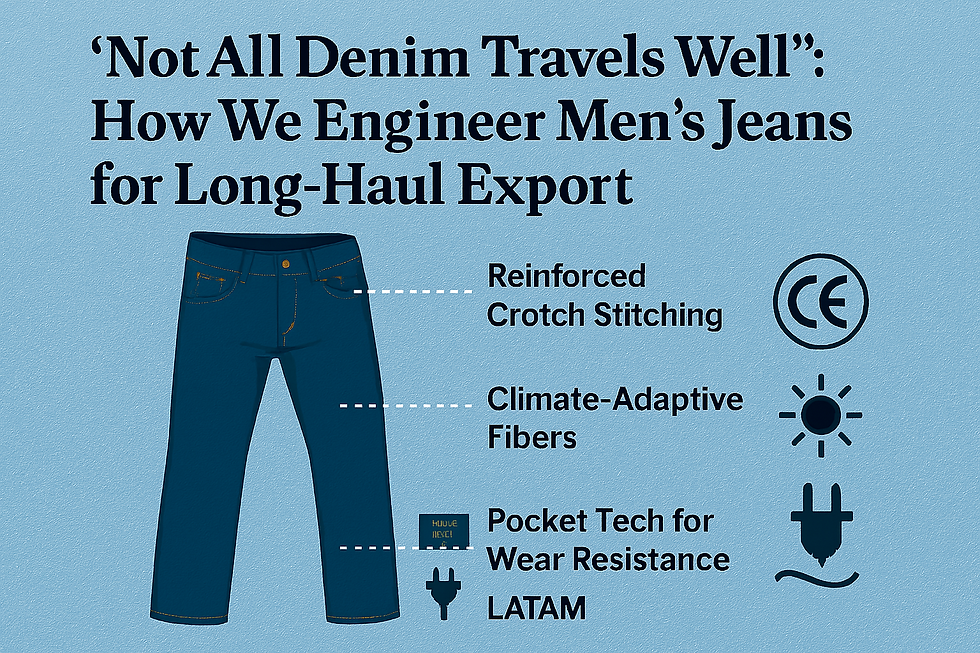Why Retailers Prefer Working with Dedicated Men’s Denim Jeans Exporters
- jlintlco
- Aug 15
- 5 min read

The men’s denim jeans market, valued at USD 86.66 billion in 2024 and projected to reach USD 121.50 billion by 2030 with a 5.9% CAGR, is a cornerstone of global fashion retail. Retailers, from boutique stores to global chains, rely on denim’s timeless appeal to drive sales. However, sourcing high-quality jeans that meet consumer demands for style, sustainability, and affordability is complex. Dedicated men’s denim jeans exporters—specialists focused solely on denim—offer distinct advantages over general apparel suppliers. In 2025, with sustainability pressures and supply chain challenges intensifying, retailers increasingly prefer these specialists for their expertise, reliability, and tailored solutions. This 1000-word blog explores why dedicated exporters are the go-to choice for retailers and how they enhance profitability and brand success.
Specialized Expertise in Denim Production
Dedicated men’s denim jeans exporters possess deep knowledge of denim’s unique production processes, from cotton selection to finishing techniques. Unlike general apparel exporters, who handle diverse fabrics, denim specialists understand the nuances of weaving, dyeing, and distressing that define jeans’ look and feel. For instance, they excel in crafting specific fits—slim, skinny, or relaxed—and mastering washes like stone-wash or acid-wash, which are central to denim’s appeal.
This expertise ensures retailers receive jeans that align with market trends, such as the 2025 rise in loose-fit and vintage-inspired designs. Specialists can replicate high-end selvedge denim from Japan or mass-produce affordable options like those from Bangladesh, meeting diverse retail needs. Their focus on denim reduces errors, ensuring consistent quality in fabric weight, stretch, and durability, which generic exporters may struggle to achieve.
Retailers benefit from this precision, as it minimizes returns due to poor fit or fading, which can cost up to 10% of sales. By delivering jeans that meet customer expectations, dedicated exporters help retailers maintain brand loyalty and reduce financial losses.
Access to Advanced Manufacturing Technologies
Dedicated exporters invest heavily in denim-specific technologies, such as laser fading, ozone washing, and water-recycling systems, which reduce environmental impact while enhancing quality. In 2025, these technologies are critical, as denim production traditionally consumes up to 7,000 liters of water per pair. Advanced methods like ozone washing cut water use by 50%, aligning with consumer demand for sustainable fashion.
These exporters also use automated cutting and sewing machines for precision, ensuring uniformity across large orders. For retailers, this means consistent sizing and finishing, critical for customer satisfaction in online and brick-and-mortar stores. General exporters, juggling multiple apparel types, may lack the specialized equipment to achieve this level of consistency.
For example, a dedicated exporter in Turkey can produce distressed jeans with laser precision, replicating high-end designs at scale, while a general supplier might rely on manual processes, risking inconsistency. Retailers partnering with specialists gain access to cutting-edge production, enhancing product appeal and reducing production delays.
Compliance with Sustainability and Ethical Standards
Sustainability is a top priority for retailers in 2025, as consumers demand eco-friendly and ethically produced clothing. Dedicated denim exporters are better equipped to meet these expectations, often holding certifications like OEKO-TEX Standard 100, Bluesign, GOTS (Global Organic Textile Standard), or GRS (Global Recycled Standard). These certify the absence of harmful chemicals, sustainable cotton sourcing, and use of recycled materials.
Ethical labor practices are another focus. Dedicated exporters in countries like Bangladesh or Vietnam often comply with Fair Wear or BSCI (Business Social Compliance Initiative) standards, ensuring fair wages and safe working conditions. This reduces the risk of reputational damage from labor scandals, which can cost retailers millions in lost sales.
General exporters, handling diverse products, may struggle to prioritize denim-specific sustainability. A dedicated exporter’s focus allows them to implement water-saving dyes or circular recycling programs, like repurposing old jeans into new fabric. Retailers benefit by aligning with consumer values, potentially increasing market share by 5-10% through eco-friendly offerings.
Reliable Supply Chain and Scalability
Large-scale retail requires a steady supply of jeans to meet fluctuating demand. Dedicated exporters maintain robust supply chains tailored to denim, sourcing cotton from BCI (Better Cotton Initiative)-certified farms and partnering with specialized logistics providers. In 2025, with disruptions like Red Sea shipping delays, their focused networks ensure resilience, unlike general exporters who may face bottlenecks juggling multiple product lines.
Scalability is another advantage. Dedicated exporters can handle orders ranging from 1,000 units for boutique retailers to millions for global chains. Their streamlined processes reduce lead times, often delivering within 4-6 weeks compared to 8-10 weeks for general suppliers. Retailers avoid stockouts, which can cost 3-5% of annual revenue, ensuring shelves remain stocked during peak seasons like back-to-school or holidays.
For example, a dedicated exporter in Pakistan can quickly scale production for a retailer’s Black Friday campaign, while a general supplier might struggle with competing priorities. Retailers benefit from faster market response and higher sales.
Customization and Trend Responsiveness
Men’s denim trends evolve rapidly, with 2025 favoring oversized fits, retro washes, and sustainable materials. Dedicated exporters excel in customization, offering tailored designs, fits, and finishes to match retailer needs. They provide tech packs, prototypes, and samples to ensure jeans align with brand aesthetics, whether for a luxury label or a budget retailer.
Their market insight keeps retailers ahead of trends. For instance, a dedicated exporter in China might propose incorporating stretch denim with 2% elastane for comfort, a top trend in 2025. General exporters, less focused on denim, may lag in spotting such shifts, risking outdated inventory that leads to markdowns costing up to 20% of profits.
Customization also includes private labeling and packaging, allowing retailers to differentiate their brand. Dedicated exporters offer flexible MOQs, enabling smaller retailers to test new designs without overcommitting.
Competitive Pricing and Financial Transparency
While dedicated exporters may charge a premium for specialized services, their efficiency and economies of scale often result in competitive pricing. They optimize denim-specific processes, reducing waste and lowering costs. For example, a dedicated exporter in India might offer high-quality jeans at $10-$15 per unit, compared to $12-$18 from a general supplier with less expertise.
Transparency is key. Dedicated exporters provide detailed cost breakdowns, covering fabric, labor, washes, and shipping. They navigate tariffs and currency fluctuations, offering fixed pricing to protect retailers from unexpected costs. Retailers should request clear payment terms, like 30% upfront and 70% on delivery, to align with cash flow.
A pitfall with general exporters is hidden fees for revisions or expedited shipping. Dedicated exporters, focused on denim, are less likely to surprise retailers with such costs, ensuring predictable budgeting.
Strong After-Sales Support
Post-delivery support is critical for retailers. Dedicated exporters offer warranties for defects, typically covering 6-12 months, and rapid response for issues like faulty zippers or stitching. They provide training on care instructions, helping retailers reduce customer complaints.
In 2025, some exporters offer digital platforms for order tracking and issue resolution, streamlining communication. General exporters, with broader portfolios, may lack this focus, leading to slower responses that frustrate retailers and customers.
How Retailers Can Choose the Right Exporter
To select a dedicated men’s denim jeans exporter, start with due diligence. Request certifications (OEKO-TEX, GOTS) and third-party audit reports from SGS or Intertek. Check references from other retailers to verify reliability. Review their sustainability practices, ensuring alignment with your brand’s values.
Place a trial order to test quality, fit, and delivery times. Visit factories or use agents for on-ground verification, especially in key hubs like China or Bangladesh. Negotiate contracts with clear terms on pricing, MOQs, and penalties for delays.
Conclusion
Retailers prefer dedicated men’s denim jeans exporters for their specialized expertise, advanced technologies, and commitment to sustainability. These exporters deliver consistent quality, scalable supply, and trend-responsive designs, helping retailers stay competitive in a market growing at 5.9% CAGR. By avoiding pitfalls like inconsistent quality or supply delays, retailers can boost profitability and customer loyalty. In 2025, partnering with a dedicated exporter is a strategic move that ensures high-quality jeans, aligns with consumer demands, and protects the bottom line. Choose wisely to thrive in the dynamic denim market.






Comments